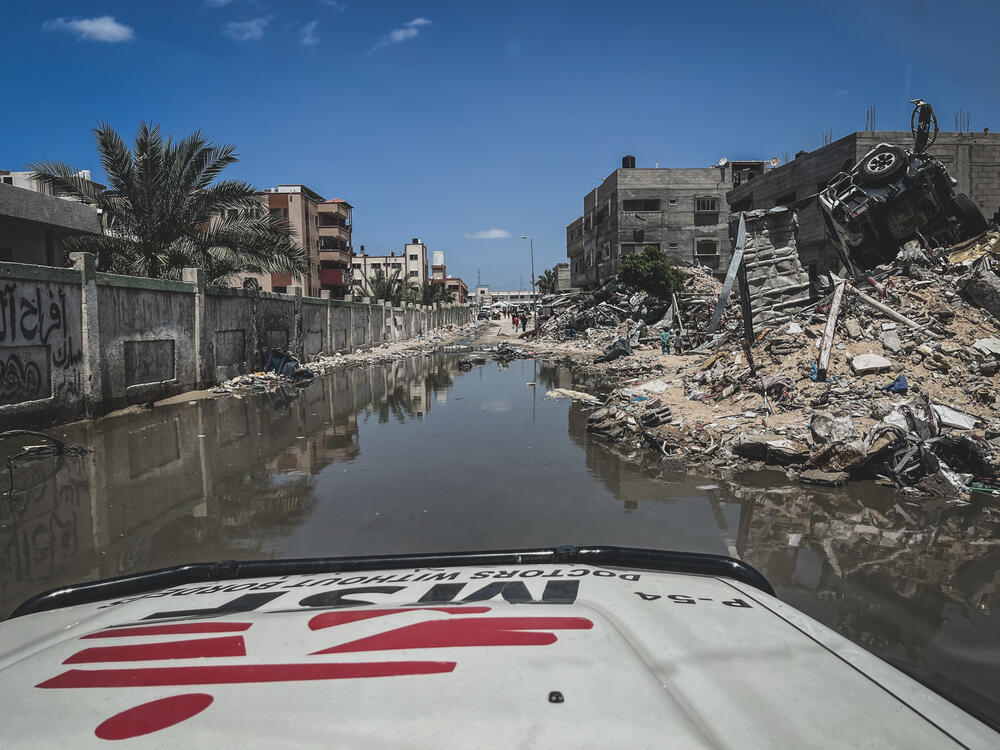Gaza: The south's last fully functioning hospital is at breaking point
Médecins Sans Frontières / Doctors Without Borders (MSF) is warning that Nasser Hospital – the last comprehensive hospital in south Gaza – risks being overwhelmed with wounded patients in mass casualty incidents.
This comes after the European Gaza Hospital, also in the south, was forced to shut down following new evacuation orders.
MSF teams working at Nasser Hospital are now seeing acute shortages of medical supplies, putting patients at risk of losing access to vital healthcare.
Running on emergency supplies
Nasser Hospital is receiving an increase in patient numbers every day, putting all departments in the hospital above their bed capacity, while our teams are running on emergency medical stocks.
In the paediatric department, there are 56 beds, but on 3 July alone MSF teams received some 100 patients.
Elsewhere, our teams in the orthopaedic department have seen a doubling of the number of patients in the past few days.
“We have children lying on the floor. There are no more mattresses and no more beds, so patients are in the corridors lying on blankets and sitting on stairs,” says MSF nurse activity manager Cristina Roldán.
“The team has put nails on the wall so we can hang the intravenous fluids and medication we need to give patients, but it's a very difficult situation, and the team is exhausted.”

Help us prepare for the next emergency
On 1 July 2024, following evacuation orders issued by Israeli forces for the areas east and south of Khan Younis, the Ministry of Health decided to precautionarily evacuate the European Gaza Hospital.
Patients were then transported in ambulances from the European Gaza Hospital to Nasser Hospital, but many were forced to leave and walk some 10 km to get there.
In total, approximately 250,000 people are at risk of displacement in Khan Younis due to the evacuation order.
“We have heard that patients have travelled on their own, either arriving at Nasser Hospital in beds or being walked by their families,” says Javid Abdelmoneim, MSF medical team leader at Nasser Hospital.
Fuel and obstructions
While dealing with an influx of new patients, Nasser is also grappling with limited fuel. This puts patients at the hospital and those in surrounding field hospitals at risk of losing life-saving care.
Nasser is the main point for the field hospitals to sterilise their equipment. If it loses electricity due to lack of fuel, sterilisation becomes difficult and the care provided at several field hospitals will come to a stop.
“Overall, it’s a comprehensive issue – from shortages of beds and supplies to the lack of surgeons,” says Abdelmoneim.
“With yet another hospital closed, patient’s lives are even more at risk."
While hospitals in Gaza continue to grapple with acute shortages of supplies, trucks carrying MSF medical supplies were denied entry into the Strip by the Israeli authorities on 3 July due to ongoing fighting in the south.
MSF has now been unable to bring any medical supplies into Gaza since the end of April.
The Israeli authorities must urgently open more crossing points to massively speed up the amount of aid getting through to Gaza.
MSF also calls on all parties to ensure safe routes to move humanitarian assistance within the Strip. This is the only way to avoid more preventable deaths.
MSF and the Israel – Gaza war
An unprecedented humanitarian crisis is unfolding in Gaza. MSF teams have worked to treat the wounded and supply overwhelmed hospitals as indiscriminate airstrikes and a state of siege threaten millions of men, women and children.
